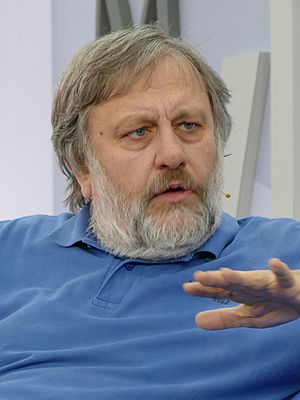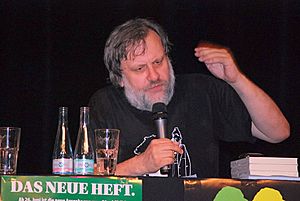Slavoj Žižek facts for kids
Quick facts for kids
Slavoj Žižek
|
|
|---|---|

Žižek in 2015
|
|
| Born | 21 March 1949 Ljubljana, PR Slovenia, FPR Yugoslavia
|
| Education |
|
| Spouse(s) |
Jela Krečič
(m. 2013) |
| Era | 20th-/21st-century philosophy |
| Region | Western philosophy |
| School |
|
| Institutions |
|
| Doctoral students | Adrian Johnston |
|
Main interests
|
|
|
Notable ideas
|
|
Slavoj Žižek (born 21 March 1949) is a famous Slovenian philosopher and cultural expert. He is known for his unique way of talking about ideas.
He works as a director at the Birkbeck Institute for the Humanities in London. He is also a professor at New York University and the University of Ljubljana. Žižek studies many topics, including philosophy, politics, movies, and religion.
He is a key figure in the Ljubljana School of Psychoanalysis. This group of thinkers studies German philosophy, psychoanalysis, and how ideas shape our world. His first book in English, The Sublime Object of Ideology, made his ideas known around the world. He has written over 50 books and speaks several languages. Žižek is famous for his lively public talks, which often include jokes and examples from pop culture.
Contents
Life and Career
Early Life and Education
Slavoj Žižek was born in Ljubljana, Yugoslavia, in 1949. His father was an economist, and his mother was an accountant. He spent part of his childhood in Portorož, where he enjoyed Western films and culture. Later, his family moved back to Ljubljana. He went to Bežigrad High School. At first, he wanted to be a filmmaker, but he decided to study philosophy instead.
In 1967, Žižek started studying philosophy and sociology at the University of Ljubljana. He was interested in French thinkers and even translated a text by Jacques Derrida into Slovenian. He wrote for different magazines. In 1971, he lost a job because his ideas were seen as "non-Marxist" by the authorities. He earned his first doctorate in Philosophy in 1981.
Academic Achievements
In the 1980s, Žižek worked on and translated books by important thinkers like Jacques Lacan and Sigmund Freud. He used Lacan's ideas to understand philosophy by Hegel and Marx.
In 1986, he earned a second doctorate in psychoanalysis from the University of Paris VIII. He also wrote introductions for Slovenian translations of detective novels.
In 1988, he published his first book focused on film theory. The next year, his book The Sublime Object of Ideology brought him international fame.
Žižek writes for many journals and newspapers around the world. He is also an editor for a book series that covers philosophy, politics, and art. In 2012, Foreign Policy magazine called him a "celebrity philosopher." He has been called the "Elvis of cultural theory" and a leading expert on Hegel and Lacan. There is even a journal dedicated to studying his work.
Public and Political Life
In the late 1980s, Žižek became known for writing columns in a youth magazine that criticized the government. He was part of a political party until 1988, when he left to protest a trial. He was active in movements that worked for democracy in Slovenia. In 1990, he even ran for a political position in Slovenia's first free elections.
Žižek is also a member of the Democracy in Europe Movement 2025 (DiEM25), which started in 2016.
He has appeared in several documentaries about his ideas. These include The Reality of the Virtual (2004), Zizek! (2005), and The ... Guide to Cinema (2006). He also appeared in Examined Life (2008), where he talked about ecology at a garbage dump.
In 2019, Žižek hosted a mini-series called How to Watch the News with Slavoj Žižek. He also had a public debate with psychology professor Jordan Peterson about happiness and economic systems.
Personal Life
Žižek has been married four times and has two adult sons. His current wife is Jela Krečič, a Slovenian journalist and philosopher.
In early 2018, Žižek had a condition called Bell's palsy, which affected one side of his face. He continued to give lectures and interviews, sometimes using his condition as a way to talk about political ideas.
Interests and Tastes
Žižek has shared his favorite movies and music. In a 2012 poll, he listed films like 3:10 to Yuma and The Sound of Music, calling them his "guilty pleasures." He also enjoys classic films from The Criterion Collection.
For music, he loves Arnold Schoenberg's Gurre-Lieder. He also enjoys works by Beethoven, Schubert, and Wagner.
Žižek often mentions Franz Kafka, Samuel Beckett, and Andrei Platonov as his favorite 20th-century writers.
Main Ideas
Žižek's ideas combine the philosophies of Hegel and Lacan. He believes that Hegel's ideas are very important for understanding the world. He also studies how our minds work and how society is organized.
Understanding Society
Žižek has contributed a lot to understanding how ideas shape our political life. He believes that many of our ideas about society are unconscious. This means we might act in ways that support certain ideas without even realizing it. He argues that simply being cynical about a situation isn't enough to change it, because our actions might still reinforce it.
Freedom and Society
Žižek often discusses what true freedom means. He suggests that in some societies, people might feel free because they have choices, but these choices are still limited by the existing power structures. He believes that real freedom involves challenging these structures.
He supported a petition against the police actions during protests in Hong Kong, emphasizing the importance of academic freedom, free speech, and the right to gather peacefully.
Views on Religion
Žižek calls himself a "Christian Atheist." He believes that atheism is important, but he also finds deep meaning in Christianity, especially Protestantism. He argues that Christianity, by bringing God into human life, actually offers a way to be truly "godless" by removing the idea of a distant, external power.
Views on Communism
Žižek identifies as a "communist" but strongly rejects the totalitarian communism of the 20th century, calling it a "catastrophe." He uses the term "communism" to mean a society that truly steps outside the current system, especially one that cares for shared resources like nature and knowledge. He believes that capitalism, despite its problems, is very good at changing society.
He supported the Occupy Wall Street protestors, saying they were "communists" because they cared for the "commons" (shared resources) that are threatened by the current system.
Electoral Politics
Žižek often shares his views on elections. In 2016, he said he would have voted for Donald Trump in the US presidential election. He hoped that Trump's win would force both major parties to rethink their positions and lead to new political movements. He later said that Trump's election did help create a stronger American left.
However, for the 2020 US election, he changed his mind, saying that with the coronavirus pandemic, he would prefer Joe Biden over Trump. He felt that Trump was harming the "ethical substance" of society.
In 2022, Žižek supported the Levica (The Left) political party in Slovenia.
Social Issues
Žižek has discussed various social topics. He has criticized multiculturalism for sometimes creating a distance between cultures rather than truly bringing them together. He argues that focusing too much on specific identities can distract from the larger fight against global capitalism.
He has also written about gender identity. He believes that all people, like transgender individuals, experience a difference between their assigned identity and their inner sense of self. He suggests that trying to escape this difference completely is not realistic. He has also discussed the tension between the idea that gender is a social construct and the idea that it is a biological fact.
Žižek has also commented on other global events. He criticized Western military actions in countries like Libya and Iraq, saying they led to chaos and the rise of groups like the Islamic State. He believes that China combines capitalism and authoritarianism in extreme ways.
After the October 7th attacks in Israel, Žižek stated that people should support Israel's right to defend itself while also sympathizing with the difficult conditions faced by Palestinians. He believes that those who see a "contradiction" in this view are preventing a solution. In April 2024, he criticized Israel's actions in Gaza, suggesting that the true goal was to take over more land.
Works
Filmography
Žižek has appeared in many films, often discussing his ideas or being the subject of documentaries.
| Year | Title |
|---|---|
| 1993 | Laibach: A Film From Slovenia |
| 1996 | Liebe Dein Symptom wie Dich selbst! |
| Predictions of Fire | |
| 1997 | Post-Socialism+Retro Avantgarde+Irwin |
| 2004 | The Reality of the Virtual |
| 2005 | Zizek! |
| 2006 | The ... Guide to Cinema |
| The Possibility of Hope | |
| 2008 | Examined Life |
| Violence | |
| 2009 | Terror! Robespierre and the French Revolution |
| Alien, Marx & Co. - Slavoj Žižek, Ein Porträt | |
| 2011 | Marx Reloaded |
| 2012 | Catastroika |
| The ... Guide to Ideology | |
| 2013 | Balkan Spirit |
| 2016 | Risk |
| Houston, We Have a Problem! | |
| 2018 | Turn On (short) |
| 2021 | Bliss |
See also
 In Spanish: Slavoj Žižek para niños
In Spanish: Slavoj Žižek para niños
 | Misty Copeland |
 | Raven Wilkinson |
 | Debra Austin |
 | Aesha Ash |


